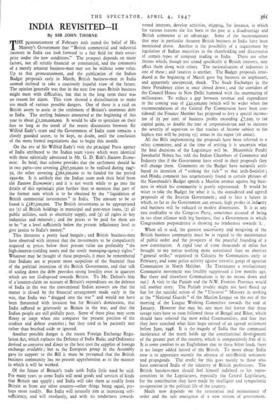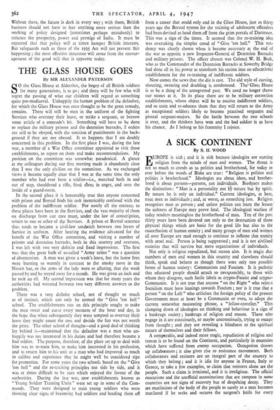INDIA REVISITED-II
By SIR JOHN THORNE
THE ponouncement of February 20th stated the belief of His Majesty's Government that "British commercial and industrial interests in India can look forward to a fair field for their enter- prise under the new conditions." The prospect depends on many factors, not all strictly financial or commercial, and the comments of a merely amateur business-man may not be without some value. Up to that pronouncement, and the publication of the Indian Budget proposals early in March, British business-men in India seemed inclined to take a cautiously hopeful view of the future. The opinion generally was that in the next few years British business might meet with difficulties, but that in the long term there was no reason for alarm. This view showed a disinclination to make too much of various possible dangers. One of these is a raid on British assets to assist in the settlement of Britain's enormous debt
to India. The sterling balances amounted at the beginning of this year to about kr,200,000,000. It would be idle to speculate on their fate so long as the trend of the recent discussions between Sir Wilfrid Eady's team and the Government of India team remains a closely guarded secret, to be kept, no doubt, until the conclusion of the more formal negotiations due to begin this month.
On the eve of Sir Wilfrid Eady's visit the principal Press agency
of India attributed to the Indian team views which were identical with those editorially advocated in Mr. G. D. Birk's Eastern Econo- mist. In brief, that scheme provides that the settlement should be in two parts—one covering L637,500,000 to be realised during 1947- 50, the other covering £562,500,000 to be funded for the period 1950-6o. It is unlikely that the Indian team took their brief from the Eastern Economist ; and it is not worth while to go into the details of this optimiuic plan further than to mention that part of the former sum which is to be obtained by the "liquidation of British commercial investments " in India. The amount to be so found is L187,500,000. The British investments to be appropriated are (t) all British holdings in municipal and port-trust loans, (2) all public utilities, such as electricity supply, and (3) all rights in key industries and minerals ; and the prices to be paid for them are to be "at a level sufficiently below the present inflationary level to give justice to India's money."
This threatens a pretty hard bargain ; and British business-men have observed with interest that the investments to be compulsorily acquired at prices below their present value are preferably "the high-interest-yielding assets and the costly managing-agency rights." Whatever may be thought of these proposals, it must be remembered that Indians are at present more suspicious of the financial than of the political intentions of the British Government, and that talk of scaling down the debt provokes strong hostility even in quarters which are not ill-disposed towards Britain. To Mr. Dalton's hint of ecounter-claim on account of Britain's expenditure on the defence of India in the war the conventional Indian answers are that the matter is closed by the financial arrangement made early in the war, that India was "dragged into the war" and would not have been threatened with invasion but for Britain's domination, that India suffered as grievously as Britain in the war, and that the Indian people are still pitifully poor. Some of these pleas may seem flimsy or inept when one compares the present position of the creditor and debtor countries; but they need to be patiently met rather than brushed aside or ignored.
Another possible danger is the recent Foreign Exchange Regu- lition Act, which replaces the Defence of India Rules ancf•Ordinance devised to conserve and direct to the best uses the supplies of foreign exchange available ; but as the European group in the Assembly gave its support to the Bill it must be presumed that the British business community has no present apprehension as to the manner in which it will be worked.
Of the future of Britain's trade with India little need be said.
For many years to come India will need goods and services of kinds that Britain can supply; and India will take them as readily from Britain as from any other country—other things being equal, per- haps more readily. But India will naturally aim at increasing self- sufficiency, and will resolutely, and with no tenderness towards vested interests, develop activities, shipping, for instance, in which for various reasons she has been in the past at a disadvantage and British commerce at an advantage. Some of the inconveniences that may in particular threaten British business in India have been mentioned above. Another is the possibility of a requirement by legislation of Indian majorities in the shareholding and directorates of certain types of company trading in India. There are other threats which, though not aimed specifically at British interests, may affect them along with others. The nationalisation of industries is one of these ; and taxation is another. The Budget proposals intro- duced at the beginning of March gave big business an unpleasant, and apparently unexpected, shock. The Stock Exchanges in the three Presidency cities at once closed down ; and the corridors of the Council House in New Delhi hummed with the murmuring of millionaires. To reduce a gap between revenue and expenditure in the coming year of £42,5oo,000 (which will be wider when the recommendations of the Central Pay Commission have been con- sidered) the Finance Member has proposed to levy a special income- tax of 25 per cent. of business profits exceeding L7,500, to tax capital gains, to double the rate of corporation-tax and to increase the severity of super-tax so that reaches of income subject to the highest rate will be paying i51- annas in the rupee (16 annas).
All the Bills implementing the proposals have been referred to a select committee, and at the time of writing it is uncertain what the final decisions of the Legislature will be. Meanwhile Pandit Jawaharlal Nehru has told the Indian Chambers of Commerce and Industry that if the Government have erred in their proposals they will change them. Comments on the Budget have naturally attri- buted its intention of "soaking the rich" to that arch-Socialist ; and Hindu comment has ungenerously found in certain phrases of the Nawabzada's Budget speech a Muslim animus against big busi- ness in which his community is poorly represented. It would be wiser to take the Budget for what it is, the considered and agreed proposals of the Interim Government ; and to face a future in which, so far as the Government can ensure, high profits in inclubstry and business will be reduced to modest dimensions. It is at any rate creditable to the Congress Party, sometimes accused of being in too close alliance with big business, that a Government in which Congressmen preponderate is showing no tenderness towards it.
When all is said, the greatest uncertainty and misgiving of the British business community must be in regard to the maintenance of public order and the prospects of the peaceful founding of a new constitution. A rapid tour of some thousands of miles has brought to my notice nothing more sensational than an abortive "general strike," organised in Calcutta by Communists early in February, and some police activity against terrorist gangs of agrarian Communists in North Malabar. (In Travancore a revolutionary Communist movement was forcibly suppressed a few months ago. But there and elsewhere Communism is by no means down and out.) A visit to the Punjab and the N.W. Frontier Province would tell another story. The Punjab trouble might not have flared up but for the suicidal action of the "Unionist" Ministry in striking at the "National Guards" of the Muslim League on the eve of the meeting of the League Working Committee towards the end of January. However that may be, one must feel horror that these savage riots have so soon followed those of Bengal and Bihar, which should have sobered the most rabid Communalists, and fear that they have scotched what faint hope existed of an agreed settlement before June, 1948. It is the tragedy of India that the communal intolerance of the north holds up the constitutional development of the greater part of the country, which is comparatively free of it. It is some comfort to an Englishman that to these bitter feuds there is no longer added hatred of the British. To move about India now is to appreciate warmly the absence of anti-British sentiment and propaganda. The credit for this goes mainly to those who have convinced India of the sincerity of British professions. The British business-man should feel himself indebted to his repre- sentatives in the Legislatures, especially the Central Legislature, for the contribution they have made by intelligent and sympathetic co-operation in the political life of the country.
Much- now depends on the restoration and maintenance of order and the safe emergence of a new system of government. business should not have to fear anything more serious than the working of policy designed (sometimes perhaps mistakenly) to enhance the prosperity, power and prestige of India. It must be expected that that policy will at times hamper British interests. But safeguards such as those of the 1935 Act will not ptevent this happening ; the most effective insurance will come from the encour- agement of the good will that is apparent today.



































 Previous page
Previous page